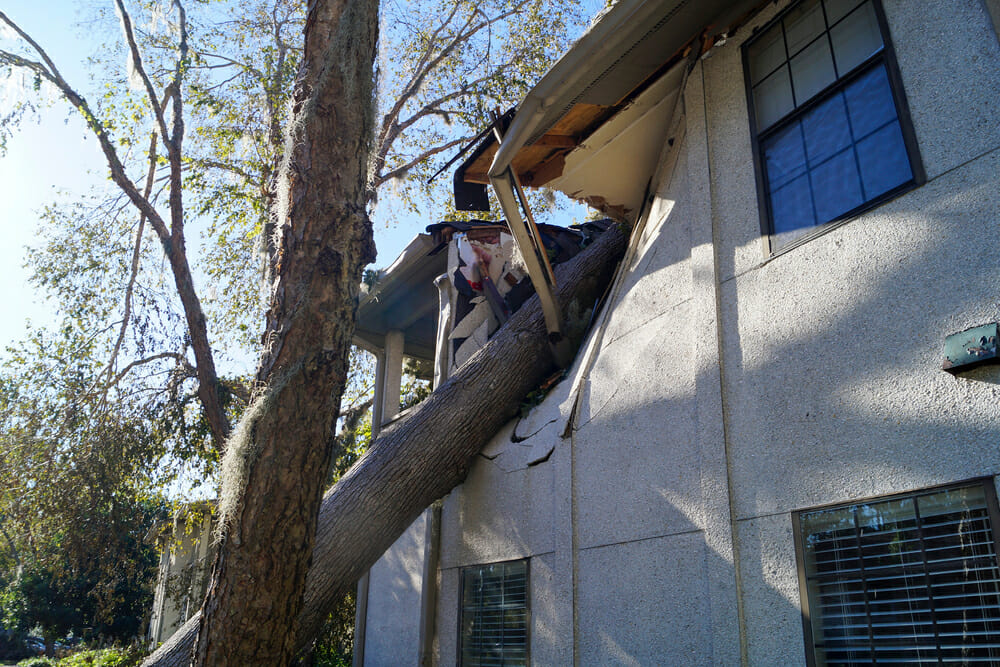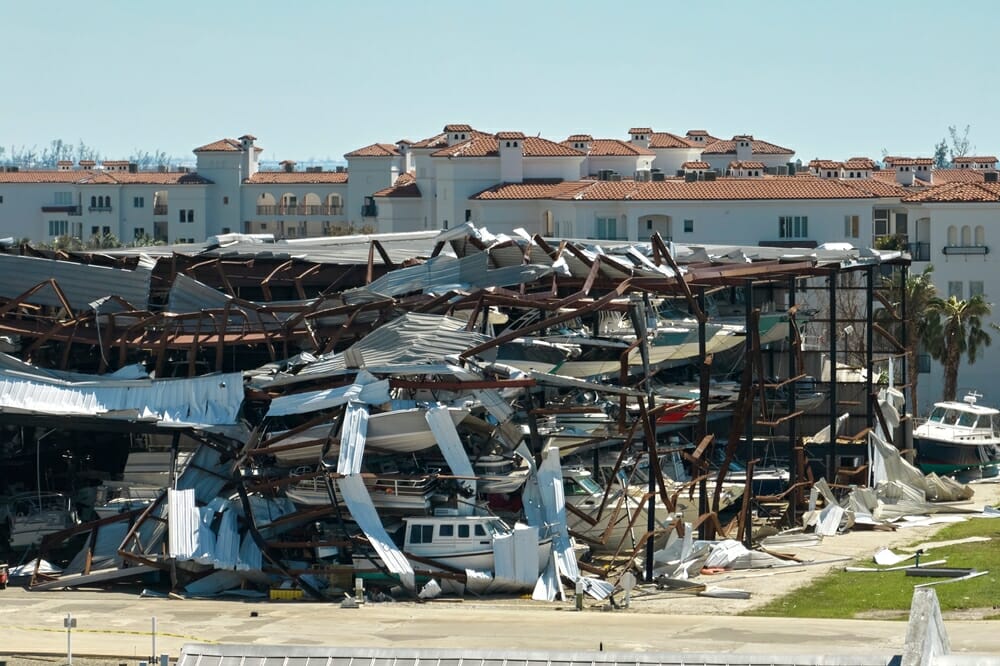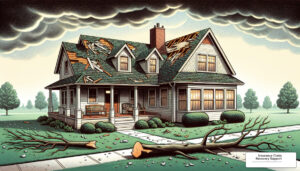We settle all kinds of property damage claims

STORM DAMAGE LOSS
Trust ICRS public adjusters to settle your storm damage insurance claim
When a storm has devastated your life, calling a public adjuster about filing a storm claim can help you put the pieces back together.
- Commercial Property Storm Claims
- Multi-Family Property Storm Claims
- High-Value Homes & Real Estate Storm Claims
Public Adjuster for Storm Claims
Has your building or home been damaged by fire, hail, wind, lightening, freeze, flood, hurricane or tornado?
Storm damage claim process
Protect your property
- Call your insurance company to report damage.
- Take pictures and video of the damage. Don’t throw anything away until your insurance adjuster tells you.
- Make temporary repairs to prevent more damage. Remove standing water. Cover broken windows and holes to keep rain out.
- Keep a list of the repairs and save receipts. Don’t make permanent repairs before the insurance adjuster sees the damage.
Filing a claim
- Call or email your insurance agent or company as soon as possible to report property damage.
- Keep a record of everyone you talked to with your company.
- Be ready to answer questions about the damage.
- Ask about an advance payment if you need help quickly.
- Ask about living expenses. Most policies will cover some of the costs you have if you are unable to live in your home because of damage that is covered by your insurance. Keep your receipts for these costs.
- If you need shelter or emergency food or water, contact the Red Cross at 800-733-2767.
Repairing your property
- Make sure your adjuster and company have your current phone number and email address.
- Make sure your address is visible from the street. You may need to post a sign with your address in the yard.
- Try to be there when the adjuster visits and point out all damage.
- Get multiple bids from contractors and compare them with the adjuster’s report before settling the claim.
- Save proof that you paid the deductible on the claim. Most state laws make it illegal for contractors or roofers to offer to waive a deductible or to promise a rebate for your deductible. Your insurance company may request proof, such a receipt or canceled check, that you paid the deductible.
Need help with an insurance claim problem? Or want to file a complaint? Here are four steps to get the help you need.
Step 1: Talk to the insurance company
You can resolve many issues by talking to or emailing your insurance company or agent. If you disagree with the adjuster’s estimate, tell the company why. The company might raise the estimate if it finds out that it overlooked something or gets new information. Send the company any supporting documents, such as a contractor’s estimate for the repairs.
If you still disagree, you have several options to challenge the insurance company’s decision. Most companies have a toll-free customer help line. The phone number is printed on your policy.
Step 2: Ask for an appraisal or hire a public adjuster
Your policy may include an appraisal process to resolve complaints. If you choose appraisal, you and the company each hire an appraiser. The two appraisers then choose a third appraiser as the umpire. You must pay for your appraiser and half of the umpire’s costs. The appraisers review your claim and estimate the amount of damage. If their estimates are different, the umpire decides. Check your policy for any deadlines to request appraisal. If you need help finding an appraiser, search for a “property damage appraiser” online or check with your contractor.
Public adjusters
Policyholders hire public insurance adjusters to help them negotiate and settle property damage claims with insurance companies. Public adjusters work for you, not the insurance company. If you hire a public adjuster, the claim remains yours. We work on a percentage contingency fee of the settlement less the deductible . Public adjusters must have a license. Learn more about what is a public adjuster?
Step 3: File a complaint with your department of insurance
State departments of insurance can help with complaints against the insurance companies, agents, and adjusters they regulate.
They typically can’t help with complaints about service providers, including mortgage companies, building contractors, and roofers. If you have a complaint against a service provider, send it to the licensing or enforcement agency that regulates the provider.
Step 4: Get legal help
If you’re still not happy with the outcome of your claim and you want to sue your insurance company with the assistance of a board certified insurance attorney or lawyer.
After the Storm > How to Ensure You Get The Storm Damage Insurance Claim Settlement You Deserve?
For a state that has weathered its share of storms, Texas was unprepared for the record-setting deep freeze that hit in mid-February and the ensuing billions in damages.
“They’re calling this the largest insurance claim event in history,” public insurance adjuster Scott Friedson, CEO of Insurance Claim Recovery Support (ICRS).
REDNews connected with Friedson while he was making the trek to Houston, where he was slated to inspect more than 35 different properties that week.
“There is no insurance risk model that accounts for a catastrophic loss to an entire state, especially the state of Texas,” he says.
Hurricanes, Friedson explains, typically cause damage along the coast. Even a hail storm or tornado has limited exposure. The freeze, on the other hand, stretched from the westernmost point of Texas to its easternmost point.
“Many property owners are juggling pipe repairs, water damage mitigation, satiating tenant demands and dealing with their insurance claims simultaneously,” says Friedson, who exclusively represents commercial and multifamily owners, as well as management companies. “The carriers adjusters are coming as quickly as they can as policyholders are grappling with understanding their policy as well as their contractual obligations in order to ensure a fair and prompt settlement.”
Typical policy language requires policyholders to “Take all reasonable steps to protect the Covered Property from further damage, and keep a record of your expenses necessary to protect the covered property, for consideration in the settlement of the claim.”
Fully understanding and interpreting what “all reasonable steps to protect from further damage” means could leave policyholders in a vulnerable and adversarial position with their insurer risking that they don’t receive the full amount they deserve. It’s why public adjusters, like Friedson, play such a vital role. He is licensed and bonded by the state and, in his role, represents policyholders’ interests, not those of the insurance company.
“When water damage occurs, we advise our clients to immediately put your insurer on notice of a claim,” he says. “We go through their policy and determine if only one deductible applies regardless of the number of locations, professional fee sub limits and we make ourselves available to meet the carrier’s representative as soon as possible to get the process moving forward.”
Friedson says the primary issue he’s seen is water mitigation due to burst pipes. While property owners are understandably focused on getting plumbers to fix the broken pipes, he worries they’re ignoring the proper mitigation needed to prevent further damage
How can policyholders dealing with water damage be assured that the water mitigation vendor will defend their work to the insurer’s and not be obligated to pay anything additional than what the insurer will pay?
“We are advising clients to ask their insurer to help provide resources, get approval upfront before engaging a 3rd party water mitigation contractor or expert, request the remediation is performed in phases with adjuster approvals along the way and negotiate contract terms and conditions that hedge policyholder risk while holding vendors accountable to defend their work in the event of disputed charges.
A local, reputable water mitigation contractor following an expert 3rd party generated protocol can provide a substantial benefit if using professional certified restoration/remediation crews that implement S500 and S520 Restoration industry standards set by the IICRC process.
The right process in place upfront should memorialize the reasonable and necessary scope of mitigation, tear out, dry out and rebuild. Simply meaning, a well documented file will hedge risk while ensuring maximum settlement in minimum time. As we enter in to leasing season, businesses who want to gain a competitive edge and be first to capture a growing Texas market with displaced tenants simply can’t afford not to have professional representation in their recovery efforts.”
As busy as he is advocating for his existing clients, Friedson knows he’ll soon get calls from property owners unsatisfied by how the process is moving along with their carriers. While it’s easier to be involved from the start, Friedson has considerable experience stepping up when needed, at any point in that process. Best of all, there is no fee for his services if there’s no recovery. That, he emphasizes, has never happened.
For more information about public adjuster Scott Friedson or Insurance Claim Recovery Support, visit InsuranceClaimRecoverySupport.com.
What is an ice dam?
Ice dam formation is caused when melting snow runs down the roof and refreezes at the roof edge. The water runs down the roof underneath the blanket of snow and then refreezes into a band of ice at the roof edge creating a “dam”. Additional snowmelt can then pool against the dam and leak into the building through the roof, attic, siding, framing, window casings, roof trim, or shingles. The most common ice dam damage is water inside walls, ceilings and floors.
Water can cause permanent buckling of hardwood floors and permanently damage to insulation. If not properly remediated, it will cause mold inside wall cavities, collapse ceilings, warp baseboards, and cause damage to content and personal belongings. A moisture meter and thermal image camera are the best tools to use to find water that can be otherwise hidden.

Should you file a claim? It depends on your deductible, extent of damage, and coverage for these types of winter weather losses which can vary depending on your specific insurance policy. If your property is damaged, be sure to reasonably protect and mitigate against further damage, contact your insurance agent right away and tell them you have a loss. Keep financial records of expenses you incur, take photos and be safe!
Why Choose Insurance Claim Recovery Support (ICRS)
When you search for the most trusted public adjusters near me for commercial and multifamily fire insurance claims, Insurance Claim Recovery Support (ICRS) is the public insurance claim adjusting firm specializing in representing the interests of policyholders dealing with large property damage claims.
We hold HAAG Commercial Roof Inspector and IICRC WRT certifications in addition to public adjuster licenses in multiple states.
ICRS routinely settles complex multi-million dollar fire claims. If you own or manage an HOA, Multifamily apartment complex, food plant, storage facility, high-value home, or other commercial property, you’re no stranger to risk management. When your real estate asset suffers a fire and smoke damage insurance claim, managing risk and knowing your policyholder rights is critical to getting the fair and prompt settlement you deserve.
Large Commercial and Multifamily fire damage insurance claims can be complex, time-consuming, frustrating, and expensive if you don’t have professional guidance and representation. Know your rights and know your settlement options.
You wouldn’t hire the I.R.S. to prepare your tax returns so why allow your insurer to prepare your insurance claim?



Years Experience
Claims Settled
Hours Worked
Average Claim Amount
Risk-Free Loss Recovery Offer
Get a complimentary consultation on your storm damage insurance claim. We are storm claim adjusters who work for policyholders, not the insurance company. If you choose to hire us, we work on contingency. No recovery, no fee. Our storm insurance claim process is proven and streamlined. We also value your privacy. We do not sell, trade, or rent your personal information to others.
Need immediate storm damage insurance claim help?
TESTIMONIALS
What Client Says About ICRS
It pays to know ICRS – “747% Higher Payments with a Public Adjuster for Claims related to a 2005 Hurricane”
Frequently Asked Questions
What is a public adjuster and what do they do?
When should I hire a public adjuster?
How are public adjusters compensated?
How do public adjusters differ from insurance company adjusters?
Do I need a public adjuster if I already have an insurance agent or broker?






